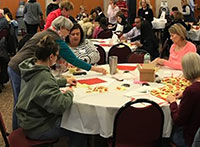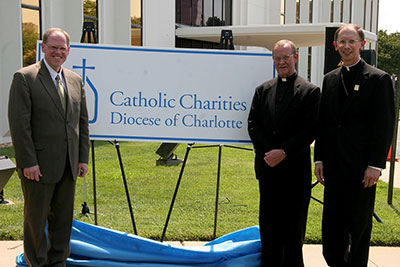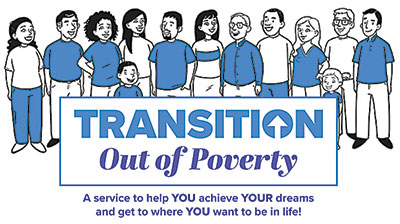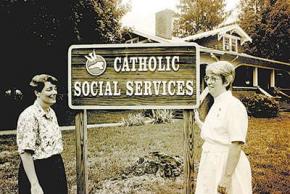 Volunteers at St. Matthew Church label bars of soap with the National Human Trafficking Hotline number for delivery to area hotels. (Photo provided by St. Matthew Parish)CHARLOTTE — When 15-year-old Theresa Flores accepted a ride home from the cute boy in her high school, she never imagined she would be drugged, raped and enslaved into the dangerous world of sex trafficking – all while living with unsuspecting parents in an upper-middle class neighborhood.
Volunteers at St. Matthew Church label bars of soap with the National Human Trafficking Hotline number for delivery to area hotels. (Photo provided by St. Matthew Parish)CHARLOTTE — When 15-year-old Theresa Flores accepted a ride home from the cute boy in her high school, she never imagined she would be drugged, raped and enslaved into the dangerous world of sex trafficking – all while living with unsuspecting parents in an upper-middle class neighborhood.
Now a national speaker, author and advocate, Flores shared her story and ways to spot and combat human trafficking with an audience of about 100 at a Saving Our Adolescents from Prostitution (SOAP) event March 23 at St. Matthew Church. Participants labeled bars of soap with the National Human Trafficking Hotline (1-888-373-7888) and delivered hundreds of bars with educational materials to area hotels in Charlotte.
“On my worst night, after being auctioned off to nearly two dozen men in a dingy, dirty, inner Detroit motel, the only thing that would have reached out to me was a bar of soap. With that in mind, I founded the SOAP Project in 2010 to help reach out to other victims,” Flores said. SOAP events are held throughout the nation and have involved over 100,000 volunteers distributing more than one million bars of soap.
The International Labor Organization estimates there are more than 40 million victims of human trafficking around the world. It estimates trafficking of human beings for forced labor or sexual exploitation generates $150 billion a year, making it the third-largest crime industry in the world behind drugs and arms trafficking.
“Most of us cannot comprehend the magnitude of the issue of human trafficking, let alone that it happens in our neighborhoods to our children,” said Lynn Anamasi, president of the Charlotte chapter of SOAP. “But we can all be part of the solution and make a difference if we know what to look for and join forces to stand up against it.”
The Catholic Church has been actively engaged in the fight against trafficking for many years. In an address to the United Nations, Pope Francis urged the world to show a greater commitment to battling “this abhorrent plague, a form of modern slavery.” He said, “Every year, thousands of men, women and children are innocent victims of labor exploitation, and sex and organ trafficking … This is ugly. It is cruel. It is criminal.”
In January, the Vatican released “Pastoral Orientations on Human Trafficking,” guidelines to help the Church fight against this evil. “Pope Francis’ insistent teaching on human trafficking provides the foundation for the present pastoral orientations which draw also from the longstanding practical experience of many international Catholic NGOs working in the field and from the observations of representatives of bishops’ conferences,” the text said.
The 40-page booklet is available at https://migrants-refugees.va/resource-center/documents. To learn more about SOAP and to get involved in the local chapter, email This email address is being protected from spambots. You need JavaScript enabled to view it.. More Catholic resources can be found at www.usccb.org/about/anti-trafficking-program/human-trafficking.cfm.
— Jenny Cox, Special to the Catholic News Herald. Jenny Cox is the Peace and Social Justice Ministry Leader at St. Matthew Church in Charlotte.
Demand slave-free supply chains
Though you may never encounter an enslaved person, the clothes you’re wearing, the phone or computer you are using or the food you’re eating may be a product of slave labor. Be an informed consumer. Encourage companies to monitor and address abuses in their supply chains. The following resources are just a few of the many that can help you ensure that your products are slave-free:
- Fair Trade International: products with the “Fair Trade” label are ethically produced and include fair labor conditions and prices as well as provisions for community development and environmental sustainability.
- My Slavery Footprint: helps you identify the extent to which your consumption habits are connected to modern-day slavery and human trafficking.
- Seafood Slavery Risk Tool: informs consumers and businesses about the risks of forced labor, human trafficking and child labor in fisheries.
You can also make an effort to purchase from businesses that are run by or support survivors. Purchases from companies such as Freeset Global, Relevée, Sari Bari, Shop for Freedom and To The Market, among others, support survivor rehabilitation, employment and the broader anti-trafficking movement.
— Source: www.humantraffickingsearch.org/take-action/for-businesses
Celebrating Catholic Charities Week May 5-11
 CHARLOTTE — Catholic Charities Diocese of Charlotte will celebrate Catholic Charities Week May 5-11. This is the 70th anniversary of Catholic Charities’ service to the people of western North Carolina.
CHARLOTTE — Catholic Charities Diocese of Charlotte will celebrate Catholic Charities Week May 5-11. This is the 70th anniversary of Catholic Charities’ service to the people of western North Carolina.
For seven decades now, the mission of Catholic Charities Diocese of Charlotte has been to strengthen families, build communities and reduce poverty.
TRANSITION OUT OF POVERTY
 Starting in May, Catholic Charities Diocese of Charlotte will offer the Transition Out of Poverty program through their three offices: Asheville, Charlotte and Winston-Salem. This new initiative is in response to families’ repeated need for assistance in hopes of getting to the root cause and helping them to become self-sufficient.
Starting in May, Catholic Charities Diocese of Charlotte will offer the Transition Out of Poverty program through their three offices: Asheville, Charlotte and Winston-Salem. This new initiative is in response to families’ repeated need for assistance in hopes of getting to the root cause and helping them to become self-sufficient.
“In the last year, more than 3,600 households visited our food pantries multiple times,” says Sandy Buck, Charlotte regional director. “Many of the individuals we serve live from one financial emergency to the next and lack the means to take care of daily and household living expenses. They have to make use of ‘give and go’ community services without the benefit of addressing the roots of their situations.”
This new initiative will enhance the food pantry services with “wrap-around” case management, Buck says.
“Case management is a systematic approach to service provision that involves planning, securing, coordinating, monitoring and advocating for unified goals and services with organizations and personnel on behalf of individuals and families,” she explains.
Catholic Charities believes that this service model seeks to better meet the needs of their clients through individualization of services.
“We will provide our program participants with longer-term strategies and solutions towards sustainable outcomes,” Buck adds.
TOP families will be able to receive as much food as they need for the month, and they will be accompanied on their journey out of poverty by a well-trained volunteer case coordinator – someone who will be there to offer support, guidance and education. Both the family and the volunteer will have the guidance of Catholic Charities’ professional staff.
“The Catholic Charities TOP program is unique as no other local agency provides free case management to connect participants to local resources for education, employment, affordable housing, and health and wellness, and directly provides as much food as a participant desires,” she noted.
Catholic Charities’ case management services and food availability are offered by appointment, so participants do not have to wait in long lines and can be arranged at times convenient to them so they do not need to miss work.
“We work with other local service providers to ensure various participant needs are met and have compiled a comprehensive list of local resources for our case coordinators to use in providing appropriate referrals based on participants’ individual needs,” Buck explains.
She says the goal of case management services provided in all of Catholic Charities’ programs is “to help our participants attain self-sufficiency. And participants in all our programs can receive food if needed. That is the benefit of ‘wrap-around services.’ We are looking at the whole person and working with them to help them achieve their goals,” she says.
— SueAnn Howell, Senior reporter

Want to help?
Catholic Charities needs many volunteers to run the Transition Out of Poverty program and donations to meet the increased need for food. Volunteer roles are volunteer case coordinators (intensive training provided), receptionists, intake and assessment volunteers, food packers and shoppers. Interested individuals can contact the volunteer coordinators in each office for more information.
Go online to www.ccdoc.org for details.
More online
Read more about the history of Catholic Charities in the Diocese of Charlotte
70 years of strengthening families, building communities and reducing poverty



